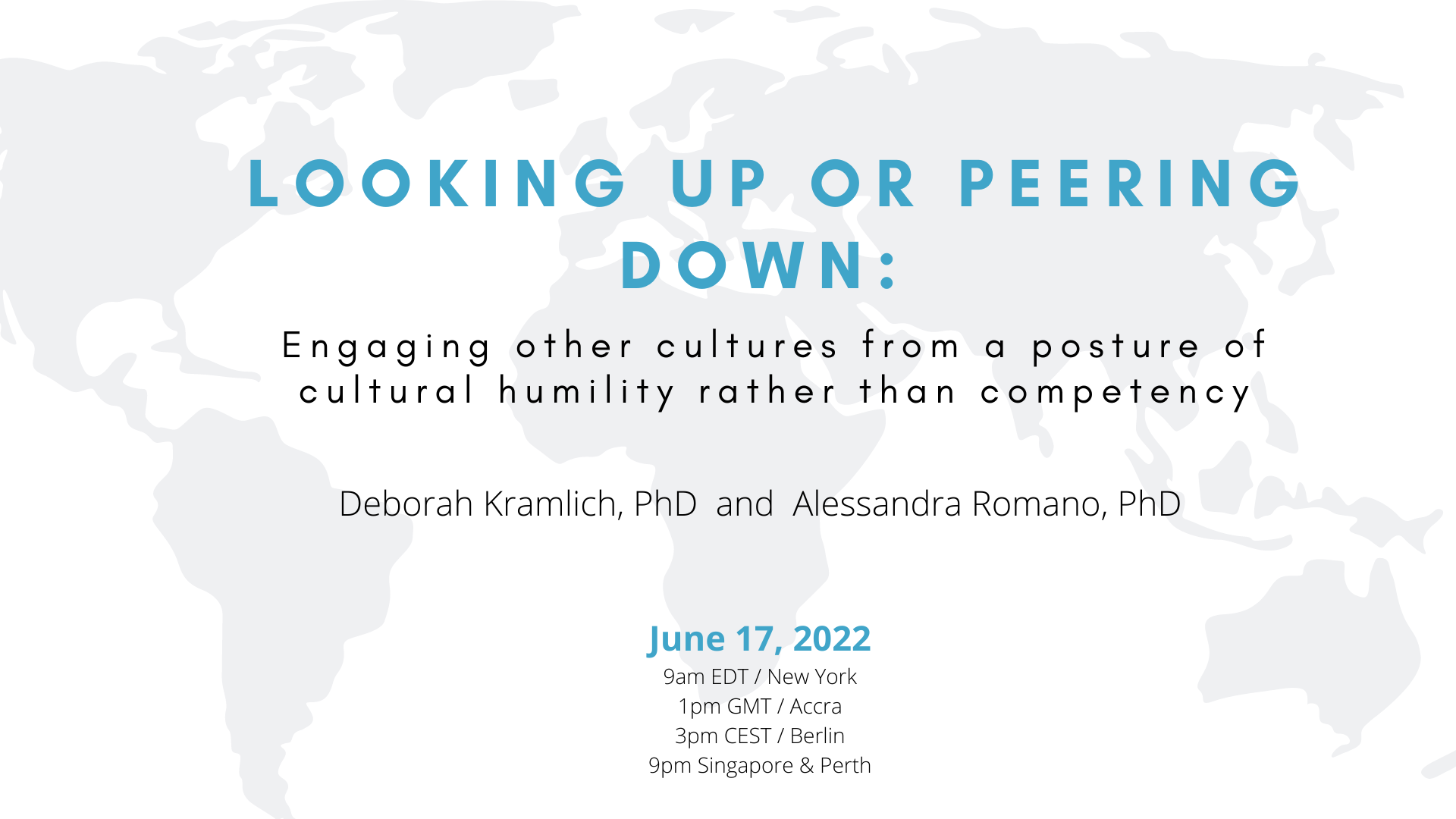Hosted by FIGT Research Network
Date: June 17, 2022
Time: 9 am EDT/ 1 pm GMT / 3 pm CEST / 9 pm Singapore & Perth
Location: Online (via Zoom)
Cost: FREE. Open to all.

Cultural humility was first coined in the medical field in work with indigenous peoples. Doctors and nurses were asked to set aside their medical competency and first approach indigenous patients with curiosity and humility to seek to understand the folk medicine practices of their patients. Cultural humility is the “ability to maintain an interpersonal stance that is other-oriented (or open to the other) in relation to aspects of cultural identity that are most important to the [person]” (Hook et al., 2013, p. 2). Cultural safety, a natural outcome following cultural humility. is characterized by “an environment that is spiritually, socially, and emotionally safe, as well as physically safe for people where there is no assault, challenge or denial of their identity, of who they are and what they need '' (Williams, 1999, p. 213).
In a multicultural world where power imbalances exist, cultural humility is a process of openness, self-awareness, being egoless, and incorporating self-reflection and critique after willingly interacting with diverse individuals. The results of achieving cultural humility are mutual empowerment, respect, partnerships, optimal care, and lifelong learning (Foronda, Baptiste, Ousman, & Reinholdt, 2016).
This webinar introduces the concept of cultural humility and suggests specific practices for both personal relationships as well as for the educator working in a multicultural classroom. Moving from a competency based approach to one of humility, curiosity, and acceptance can open up the space for both safety and belonging to be fostered and nurtured. During the webinar, the two facilitators propose a framework for educators, practitioners, teachers, academics, to create a culture of belonging both through their personal presence and in their practice in schools and higher education. This framework includes five practices to promote a culture of humility, self-awareness, and belonging:
- inward reflection
- adopting the right posture
- asking the right questions to seek connection
- showing recognition
- and acceptance regardless of the differences between both parties.
In addition, the presenters will share examples of research about cultural humility in practice. Specifically, they explain cross-sectional studies that investigated how cultural humility can reinforce (and be correlated with) positive contact relationships in multicultural contexts (Rullo, et al., 2022).
%20Presenter%20Headshots%20100%20x%20100.png) Deborah Kramlich, PhD is a postdoctoral research associate at Payap University in Chiang Mai, Thailand as well as an English teacher for the Christliche Schule Chiang Mai. She has raised her 7 children abroad mostly in national school settings as well as taught English as a Foreign Language on three continents. She is developing a framework for educators to foster a cultural of belonging in the multicultural classroom as well as doing research in cultural humility and safety and transformative listening.
Deborah Kramlich, PhD is a postdoctoral research associate at Payap University in Chiang Mai, Thailand as well as an English teacher for the Christliche Schule Chiang Mai. She has raised her 7 children abroad mostly in national school settings as well as taught English as a Foreign Language on three continents. She is developing a framework for educators to foster a cultural of belonging in the multicultural classroom as well as doing research in cultural humility and safety and transformative listening.
 Alessandra Romano, PhD is an associate professor at the University of Siena. She has a particular strand of research in art-based methods to promote critical thinking. She is the Co-Convenor of the ESREA Network on Transformative and Emancipatory Adult Education. She is the Scientific Coordinator of several training courses on multicultural education within the framework of the F.O.R.w.A.R.D. Project (MUR ID: 85901).
Alessandra Romano, PhD is an associate professor at the University of Siena. She has a particular strand of research in art-based methods to promote critical thinking. She is the Co-Convenor of the ESREA Network on Transformative and Emancipatory Adult Education. She is the Scientific Coordinator of several training courses on multicultural education within the framework of the F.O.R.w.A.R.D. Project (MUR ID: 85901).


